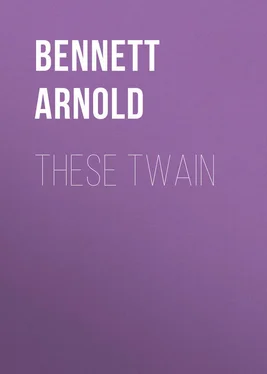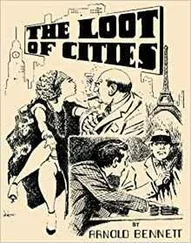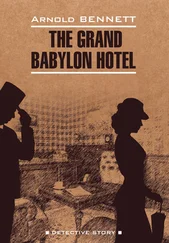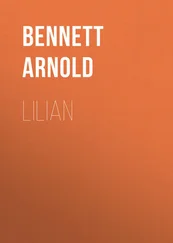Arnold Bennett - These Twain
Здесь есть возможность читать онлайн «Arnold Bennett - These Twain» — ознакомительный отрывок электронной книги совершенно бесплатно, а после прочтения отрывка купить полную версию. В некоторых случаях можно слушать аудио, скачать через торрент в формате fb2 и присутствует краткое содержание. Жанр: foreign_prose, foreign_antique, foreign_language, на английском языке. Описание произведения, (предисловие) а так же отзывы посетителей доступны на портале библиотеки ЛибКат.
- Название:These Twain
- Автор:
- Жанр:
- Год:неизвестен
- ISBN:нет данных
- Рейтинг книги:5 / 5. Голосов: 1
-
Избранное:Добавить в избранное
- Отзывы:
-
Ваша оценка:
- 100
- 1
- 2
- 3
- 4
- 5
These Twain: краткое содержание, описание и аннотация
Предлагаем к чтению аннотацию, описание, краткое содержание или предисловие (зависит от того, что написал сам автор книги «These Twain»). Если вы не нашли необходимую информацию о книге — напишите в комментариях, мы постараемся отыскать её.
These Twain — читать онлайн ознакомительный отрывок
Ниже представлен текст книги, разбитый по страницам. Система сохранения места последней прочитанной страницы, позволяет с удобством читать онлайн бесплатно книгу «These Twain», без необходимости каждый раз заново искать на чём Вы остановились. Поставьте закладку, и сможете в любой момент перейти на страницу, на которой закончили чтение.
Интервал:
Закладка:
Her love had the maladies of a woman's love when it is great; these may possibly be also the maladies of a man's love. It could be bitter. Certainly it could never rest from criticism, spoken or unspoken. In the presence of others she would criticise him to herself, if not aloud, nearly all the time; the ordeal was continuous. When she got him alone she would often endow him at a stroke with perfection, and her tenderness would pour over him. She trusted him profoundly; and yet she had constant misgivings, which weakened or temporarily destroyed her confidence. She would treat a statement from him with almost hostile caution, and accept blindly the very same statement from a stranger! Her habit was to assume that in any encounter between him and a stranger he would be worsted. She was afraid for him. She felt that she could protect him better than he could protect himself, – against any danger whatever. This instinct to protect him was also the instinct of self-protection; for peril to him meant peril to her. And she had had enough of peril. After years of disastrous peril she was safe and George was safe. And if she was passionately in love with Edwin, she was also passionately in love with safety. She had breathed a long sigh of relief, and from a desperate self-defender had become a woman. She lay back, as it were, luxuriously on a lounge, after exhausting and horrible exertions; she had scarcely ceased to pant. At the least sign of recurring danger all her nerves were on the qui vive . Hence her inimical attitude towards the project of the new works and the extension of lithography in Bursley. The simpleton (a moment earlier the perfect man) might ruin himself-and her! In her view he was the last person to undertake such an enterprise.
Since her marriage, Clara, Maggie, and Auntie Hamps had been engaged in the pleasant endless task of telling her all about everything that related to the family, and she had been permitted to understand that Edwin, though utterly admirable, was not of a creative disposition, and that he had done nothing but conserve what his father had left. Without his father Edwin "would have been in a very different position." She believed this. Every day, indeed, Edwin, by the texture of his hourly life, proved the truth of it… All the persons standing to make a profit out of the new project would get the better of his fine ingenuous temperament-naturally! She knew the world. Did Edwin suppose that she did not know what the world was? … And then the interminable worry of the new enterprise-misgivings, uncertainties, extra work, secret preoccupations! What room for love, what hope of tranquillity in all that? He might argue- But she did not want to argue; she would not argue. She was dead against the entire project. He had not said to her that it was no affair of hers, but she knew that such was his thought, and she resented the attitude. No affair of hers? When it threatened her felicity? No! She would not have it. She was happy and secure. And while lying luxuriously back in her lounge she would maintain all the defences of her happiness and her security.
Holding the green book in front of her, Edwin said quietly:
"Read this!"
"Which?"
He pointed with his finger.
She read:
" I think I could turn and live with animals, they are so placid and self-contained.
I stand and look at them long and long.
They do not sweat and whine about their condition.
They do not lie awake in the dark and weep for their sins.
They do not make me sick discussing their duty to God.
Not one is dissatisfied, not one is demented with the mania of owning things.
Not one kneels to another, nor to his kind that lived thousands of years ago.
Not one is respectable or unhappy over the whole earth. "
Edwin had lately been exciting himself, not for the first time, over Walt Whitman.
"Fine, isn't it?" he said, sure that she would share his thrill.
"Magnificent!" she agreed with quiet enthusiasm. "I must read more of that." She gazed over the top of the book through the open blue-curtained window into the garden.
He withdrew the book and closed it.
"You haven't got that tune exactly right, you know," he said, jerking his head in the direction of the music.
"Oh!" She was startled. What did he know about it? He could not play the piano.
"Where are you?" he asked. "Show me. Where's the confounded place on the piano? Well! At the end you play it like this." He imitated her. "Whereas it ought to be like this." He played the last four notes differently.
"So it ought!" She murmured with submission, after having frowned.
"That bit of a tune's been running in my head, too," he said.
The strange beauty of Whitman and the strange beauty of Dvorak seemed to unite, and both Edwin and Hilda were uplifted, not merely by these mingled beauties, but by their realisation of the wondrous fact that they both took intense pleasure in the same varied forms of beauty. Happiness rose about them like a sweet smell in the spaces of the comfortable impeccable drawing-room. And for a moment they leaned towards each other in bliss-across the open question… Was it still open? … Ah! Edwin might be ingenuous, a simpleton, but Hilda admitted the astounding, mystifying adroitness of his demeanour. Had he abandoned the lithographic project, or was he privately nursing it? In his friendliness towards herself was there a reserve, or was there not? She knew … she did not know … she knew… Yes, there was a reserve, but it was so infinitesimal that she could not define it, – could not decide whether it was due to obstinacy of purpose, or merely to a sense of injury, whether it was resentful or condescending. Exciting times! And she perceived that her new life was gradually getting fuller of such excitements.
"Well," said he. "It's nearly three. Quarter-day's coming along. I'd better be off down and earn a bit towards Maggie's rent."
Before the June quarter-day, he had been jocular in the same way about Maggie's rent. In the division of old Darius Clayhanger's estate Maggie had taken over the Clayhanger house, and Edwin paid rent to her therefor.
"I wish you wouldn't talk like that," said Hilda, pouting amiably.
"Why not?"
"Well, I wish you wouldn't."
"Anyhow, the rent has to be paid, I suppose."
"And I wish it hadn't. I wish we didn't live in Maggie's house."
"Why?"
"I don't like the idea of it."
"You're sentimental."
"You can call it what you like. I don't like the idea of us living in Maggie's house. I never feel as if I was at home. No, I don't feel as if I was at home."
"What a kid you are!"
"You won't change me," she persisted stoutly.
He knew that she was not sympathetic towards the good Maggie. And he knew the reasons for her attitude, though they had never been mentioned. One was mere vague jealousy of Maggie as her predecessor in the house. The other was that Maggie was always very tepid towards George. George had annoyed her on his visits previous to his mother's marriage, and moreover Maggie had dimly resented Edwin's interest in the son of a mysterious woman. If she had encountered George after the proclamation of Edwin's engagement she would have accepted the child with her customary cheerful blandness. But she had encountered him too soon, and her puzzled gaze had said to George: "Why is my brother so taken up with you? There must be an explanation, and your strange mother is the explanation." Edwin did not deny Maggie's attitude to George, but he defended Maggie as a human being. Though dull, "she was absolutely the right sort," and the very slave of duty and loyalty. He would have liked to make Hilda see all Maggie's excellences.
"Do you know what I've been thinking?" Hilda went on. "Suppose you were to buy the house from Maggie? Then it would be ours."
Читать дальшеИнтервал:
Закладка:
Похожие книги на «These Twain»
Представляем Вашему вниманию похожие книги на «These Twain» списком для выбора. Мы отобрали схожую по названию и смыслу литературу в надежде предоставить читателям больше вариантов отыскать новые, интересные, ещё непрочитанные произведения.
Обсуждение, отзывы о книге «These Twain» и просто собственные мнения читателей. Оставьте ваши комментарии, напишите, что Вы думаете о произведении, его смысле или главных героях. Укажите что конкретно понравилось, а что нет, и почему Вы так считаете.












